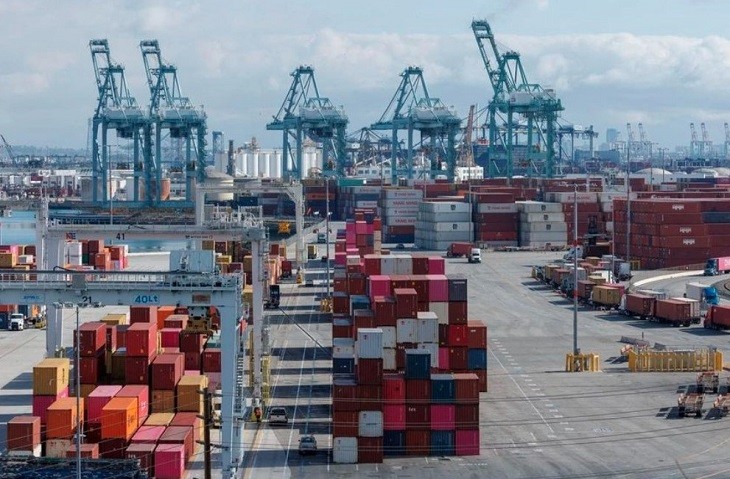(VOVWORLD) - The World Trade Organization forecasts a sharp decline in global trade this year and warns that the impacts of new US tariffs could trigger the most serious global economic downturn since the COVID-19 pandemic.
 The WTO warns of risks from tit-for-tat trade tariffs between China and the US. (Photo: Reuters) The WTO warns of risks from tit-for-tat trade tariffs between China and the US. (Photo: Reuters) |
The WTO’s Global Trade Outlook and Statistics projects that global trade will shrink 0.2% this year, an alarming drop from the 3% growth forecast in October last year.
Sharp contraction
The WTO’s pessimistic outlook is due primarily to a “tariff war” triggered by the US’s imposition of a 10% import tariff on goods from every country, with a 25% tariff on steel, aluminum, and automobiles. Reciprocal tariffs ranging from 10% to 39% on goods from 180 economies have also been announced, although President Trump has now called a 90-day pause on them to allow countries to negotiate.
Tit-for-tat tariff retaliation between the US and China, the world’s two largest economies, has escalated to an alarming level.
The WTO says that, if Trump follows through on all his proposed tariffs, it will reduce goods trade by 0.6 percentage points, with another 0.8 point cut due to spillover effects beyond US-linked trade. Taken together, the decline will be 1.5%, the steepest drop since 2020.
A 90-day pause on reciprocal tariffs does little to ease global trade uncertainties, said Pamela Coke-Hamilton, Executive Director of the UN’s International Trade Centre.
“The indeterminate extension of 90 days on and on does not necessarily lend itself to stability. So, irrespective of whether there is an extension on and on, the fact that there is no stability, there's no predictability will affect trade and firms and decisions that are being made in real time,” said Coke-Hamilton.
Global goods trade is projected to decline, and service trade will also be hit hard. The WTO said it now expects commercial services trade to grow 4% in 2025 and 4.1% in 2026, well below baseline projections of 5.1% and 4.8%.
“Services trade, while not directly subject to tariffs, is also expected to be adversely affected. Declines in goods trade are likely to reduce demand for related services, such as transport and logistics, while broader uncertainty is likely to dampen discretionary spending on travel and to slow investment-related services. As a result, the volume of global services trade is now forecast to grow by 4% in 2025 and 4.1% in 2026,” WTO Chief Economist Ralph Ossa said.
These are not the worst-case scenarios. WTO Director-General Ngozi Okonjo-Iweala said the gravest concern is the economic decoupling of China and the US. Under such a scenario, global GDP could fall 7% over the long term. Major credit rating agencies like Fitch and S&P said Thursday that this year’s growth is projected to be 2 to 2.2%, the weakest since COVID ravaged the global economy in 2020.
Growing concerns about the US economy
Within the US, the initiator of the tariff war, concerns are mounting. Federal Reserve Chairman Jerome Powell spoke at the Economic Club of Chicago on Wednesday.
“The administration is implementing significant policy changes, in particularly trade now is the focus. The effects of that are likely to move us away from our goals. Unemployment is likely to go up as the economy slows in all likelihood. Inflation is likely to go up as tariffs find their way in some part of this tariffs come to be paid by the public. That's the strong likelihood,” said Powell.
According to Powell, slowing growth, rising unemployment, and increasing inflation have not happened simultaneously in nearly 50 years, posing a grave challenge to its policy management.
Austan Goolsbee, President of the Federal Reserve Bank of Chicago, said last week that President Trump’s tariff policies are putting the Fed in a tough position. The tariffs are causing a supply-side shock that is simultaneously worsening both of the Fed’s mandates of controlling inflation and boosting employment, something it has never dealt with.
Still, Powell said the Fed will not adjust its policies yet, pending data to determine the full impact of the administration’s new trade measures. His remarks have been interpreted as the strongest warning to date against the Trump administration’s tariff policy. David Russell, Global Market Strategy Director at Trade Station, said Powell’s statement signals that the Fed will not simply cut interest rates at the White House’s request.
Observers warn that the situation is straining the already tense relationship between President Trump and the independent Federal Reserve.